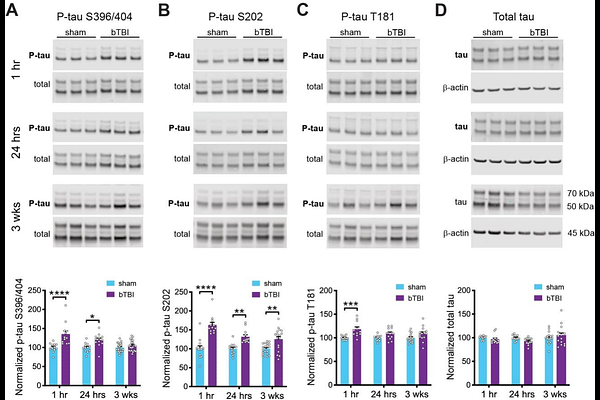PP2A METHYLESTERASE, PME-1, AND PP2A METHYLTRANSFERASE, LCMT-1, CONTROL SENSITIVITY TO IMPAIRMENTS CAUSED BY INJURY-RELATED OLIGOMERIC TAU

PP2A METHYLESTERASE, PME-1, AND PP2A METHYLTRANSFERASE, LCMT-1, CONTROL SENSITIVITY TO IMPAIRMENTS CAUSED BY INJURY-RELATED OLIGOMERIC TAU
Sundaresh, S. N.; Vogel, E. W.; Hue, C. D.; Zhang, H.; Staniszewski, A.; Berman, H. L.; Gill, Z.; Asam, K.; Liang, S.; Shen, L.; Gnanaprakash, M.; Acquarone, E.; Fa, M.; Kanaan, N. M.; Morrison, B.; Arancio, O.; Nicholls, R. E.
AbstractOligomeric species of tau are a hallmark of multiple neurodegenerative diseases such as Alzheimer\'s disease (AD) and chronic traumatic encephalopathy (CTE). Given the evidence implicating protein phosphatase 2A (PP2A) in the molecular pathogenesis of tau-related neurodegenerative disorders, we sought to determine whether manipulating the expression of enzymes that regulate PP2A activity, such as leucine carboxyl methyltransferase 1 (LCMT-1) and protein methyl esterase 1 (PME-1), might impact pathological responses to oligomeric tau. Here, we tested the effect of transgenic overexpression of LCMT-1 or PME-1 on cognitive and electrophysiological impairments caused by exposure to either recombinant oligomeric human tau or oligomeric tau prepared from mice subjected to blast-induced traumatic brain injury. We found that overexpression of LCMT-1 reduced sensitivity to tau-induced impairments, while overexpression of PME-1 increased sensitivity to these impairments. Moreover, we found that shockwave exposure increased the propensity of endogenous tau to form toxic oligomers. These results suggest that manipulating LCMT-1 or PME-1 activity may represent novel therapeutic approaches for disorders involving exposure to pathogenic forms of oligomeric tau.